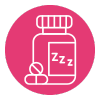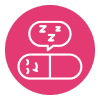- Select
- Addiction
- Rehab Treatment

Written by:
Last Updated:
January 22nd, 2025
Sleeping Pills Addiction
In February 2023, the NHS released figures that showed more than one million in the UK were prescribed sleeping pills each year. Designed to help people suffering from insomnia and other sleep issues, these numbers are reflected globally with sleeping pills among the most used medicines in the world. It is perhaps not surprising then that sleeping pills addiction is becoming a major issue both at home and abroad. Sleeping pills addiction can be every bit as dangerous as an addiction to illegal drugs and proper precautions must be taken both by users and their prescribing doctors.
What are sleeping pills?
Sleeping pills, also called sedatives or hypnotics, are medicines that help you fall asleep or stay asleep if you wake up a lot during the night. There are different kinds of sleeping pills, including:
Barbiturates
These are the oldest types of sleeping pills that make you feel sleepy by slowing down the activity of your brain. They are not used as much today because they can be very addictive and have numerous unpleasant side effects.
Benzodiazepines
These are more common today and are used to help with anxiety and sleep. They also slow down brain activity to help you relax and fall asleep. However, benzos can be highly addictive if used for a long time or in high doses.
Z-drugs
These are newer sleeping pills that work similarly to benzodiazepines. The term “Z-drugs” comes from many of them, starting with the letter “Z”, including Zolpidem, Zopiclone and Zaleplon. They were designed to have fewer side effects and be less addictive but you can still develop an addiction to Z-drugs, especially if you misuse them.
Over-the-counter sleeping pills
These are sleeping pills you can buy without a doctor’s prescription. They often contain antihistamines, which are usually used for allergies but can make you sleepy as a side effect. Addiction to over-the-counter sleeping pills is rare but it can still happen if you are not careful.
What is sleeping pills addiction?
The simplest definition of sleeping pills addiction is when you feel like you can’t stop taking them even though they are causing problems or harming you. It is often categorised as a prescription drug addiction but it can also develop if you take sleeping pills to get high, relax or because you are stressed or unhappy.
If you take sleeping pills for a long time, you will start to notice they don’t work as well as they used to. It can then be tempting to start taking more and more. This can cause them to build in your system and create a physical dependency where your body and brain grow so used to having them that they can’t work properly without them. The result is that if you try to quit or even take less, you will go into a sleeping pill withdrawal with intense cravings, rebound insomnia, extreme anxiety and sometimes even seizures.
However, sleeping pills addiction is more than just a physical dependency. After using a lot of sleeping pills for a long time, you can begin to feel like you need them to get through the day. This can make it seem impossible to do anything without sleeping pills, which can make it very hard to stop taking them.
What are the most addictive sleeping pills?
Barbiturates, benzodiazepines and even over-the-counter sleeping pills can all be addictive. As well as these, some of the most common sleeping pill addictions that we see at Banbury Lodge are to these Z-drugs:
Zaleplon Addiction
You might develop an addiction to Zaleplon (Sonata) if you continue using it regularly to help you sleep or relax, but eventually begin relying on it to manage stress, anxiety, or other personal issues. Over time, this can lead to dependency, making it difficult to function without the medication. Click to learn more.
Zolpidem Addiction
Zolpidem, known as Ambien, is a potent sedative prescribed for insomnia and sleep disorders. When taken excessively, it can quickly lead to addiction, resulting in physical dependence, withdrawal symptoms, and significant disruptions to mental health. Click to learn more.
Zopiclone Addiction
You could become addicted to Zopiclone if you start taking it in higher doses than prescribed or use it recreationally to get high or cope with stress, anxiety, or other personal issues. This can lead to tolerance, meaning you’ll need more of the drug to achieve the same effects, followed by physical and psychological dependence, and addiction.
What causes sleeping pills addiction?
We now understand why some people are able to take sleeping pills safely while others are more likely to become addicted. There are various different factors which in combination can increase your risk which you need to be aware of if you are planning to take sleeping pills:
- Having parents or close relatives with substance abuse issues
- Using sleeping pills without a prescription or not following your prescription properly
- Taking sleeping pills for stress, to cope with mental health struggles or to get high
- Being able to get sleeping pills easily
- Not understanding the risks of sleeping pills
Sleeping pills addiction side effects and dangers
Sleeping pills, abuse, and addiction can lead to many dangers, some of which can even be deadly. Some of the most serious dangers you need to be aware of include:
Sleeping pills overdose
Taking too many sleeping pills or mixing them with other substances, like alcohol, can lead to a fatal overdose. Symptoms of an overdose include extreme drowsiness, confusion, slow or difficult breathing and loss of consciousness, so if you spot these, get help right away.
Respiratory issues
Sleeping pills can create or worsen breathing problems. Older users, in particular, need to be very careful when using sleeping pills as they are more likely to develop these issues.
Heart problems
Some pills can greatly slow your heart rate, leading to serious and possibly life-threatening heart problems.
Memory lapses and hallucinations:
Abusing sleeping pills can lead to confusion, memory problems, and even hallucinations. Long-term misuse of these medications can exacerbate existing mental health conditions like depression and anxiety, or potentially give rise to new ones. It’s crucial to use sleeping pills only as prescribed to avoid these serious consequences.
Rebound insomnia
Over time, sleeping pills can stop working effectively as you develop a tolerance, and when you quit, your insomnia can return even worse.
How is sleeping pill addiction treated?
Treating sleeping pill addiction involves three important steps.
The first is prescription drug detox which helps you safely stop using sleeping pills under medical care. This process helps your body adjust and manage withdrawal symptoms which can be dangerous if you try to detox alone.
Next is prescription drug rehab. This is when you participate in various therapies to understand why you became addicted. Rehab helps you deal with any issues behind your sleeping pill addiction so the same problems don’t arise later.
The final step is relapse prevention. This step involves creating a plan to stay addiction-free and will usually include aftercare, making positive lifestyle changes and joining support groups local to you, like Narcotics Anonymous.
Get help for sleeping pills addiction today
If you are addicted to sleeping pills, help is available! Banbury Lodge’s treatment plans incorporate all three crucial recovery steps to give you the best chance of success. We know that reaching out can be scary, but Banbury Lodge has helped countless people just like you overcome sleeping pill addiction and live a happier, healthier life. Contact us today to find out more.
Frequently Asked Questions
(Click here to see works cited)
- NCBI. “Using medication: What can help when trying to stop taking sleeping pills and sedatives?” NCBI, 20 April 2010, https://www.ncbi.nlm.nih.gov/books/NBK361010/. Accessed 16 July 2024.
- Stalos, Steffini. “Sleeping Pill Addiction and Symptoms.” Health, 14 July 2022, https://www.health.com/condition/sleep/sleeping-pill-addiction. Accessed 16 July 2024.
UK-Rehab. “Benzodiazepine Addiction | UK Rehab.” UK-Rehab, https://www.uk-rehab.com/benzodiazepine-addiction/. Accessed 16 July 2024. - UK-Rehab. “How to Tell If You Have Become Addicted to Sleeping Pills.” UK-Rehab, https://www.uk-rehab.com/sleeping-pills-addiction/how-to-tell-if-you-have-become-addicted-to-sleeping-pills/. Accessed 16 July 2024.
- Brett, Jonathan, and Bridin Murnion. “Management of benzodiazepine misuse and dependence.” Australian prescriber vol. 38,5 (2015): 152-5. doi:10.18773/austprescr.2015.055



.png)



